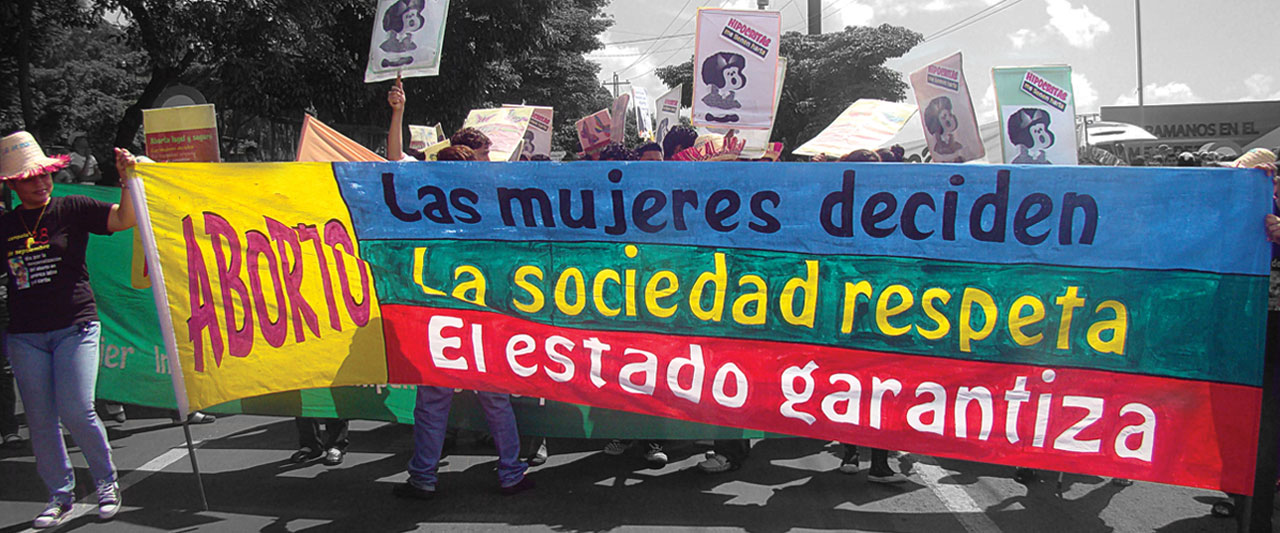On Oct. 26, Ipas Central America and its partners in the region marked 10 years since Nicaragua’s government enacted a total abortion ban, endangering the lives of women and girls and forcing those with unwanted pregnancies to carry them to term against their will or seek clandestine and often unsafe abortions.
In Nicaragua’s capital, Managua, Ipas presented a study titled “Forced pregnancy after rape: Child mothers younger than 14 years old” and an accompanying collection of testimonials from girls interviewed for the study (both available only in Spanish). The event had a diverse audience: national organizations that work with children; government institutions, which attended these events for the first time in 10 years; and organizations from the wider women’s movement.
The study shows that every year approximately 6,750 girls between ages 10-14 are victims of sexual violence, and 1,300 become pregnant, according to Nicaragua’s 2011-12 National Demography and Health Survey. But Ipas’s report asserts that in reality the number of young girls who become pregnant from rape is much higher, as the same survey found 70 percent of girls who experience rape under the age of 15 never seek help or report the crime.
A letter-signing campaign launched along with the study aims to collect thousands of signed letters to Nicaragua’s president asking the government to take immediate action to fight sexual violence, ensure access to justice for victims, and legalize abortion in cases of rape.
“To prevent further suffering by girls with pregnancies forced by rape, it’s urgent that the law permit the option of abortion, to safeguard their physical and emotional health, along with other measures to socially reintegrate them as girls,” writes Ipas Central America Director Marta María Blandón in the study’s introduction. She highlights that national surveys show more than 60 percent of Nicaraguans support making abortion legal and available to protect a woman’s life or health, and in cases of rape and fetal malformation.
Calls for repeal
The reality facing Nicaraguan girls is quite different from most of their peers in Latin America. The study points to Argentina, Brazil, Cuba, Colombia, Mexico, Uruguay and other countries in the region that allow abortion in cases of rape. Since passing the total abortion ban in 2006, Nicaragua’s government has received international pressure to repeal the law, as Nicaraguan advocates and leaders in women’s health and rights have repeatedly petitioned the Supreme Court to review the law’s constitutionality.
Ipas Central America has been working with partners for 10 years to build a movement in support of repealing the ban (this video explains all the progress made). And as the new study stresses, the abortion ban is not the only problem: Systemic failings in the health and legal sectors also create a culture of impunity for sexual violence perpetrators and a lack of sufficient treatment and justice for victims—all further denying women and girls their human rights.
“The State has a fundamental role in addressing this problem—from prevention, protection and treatment, to ensuring the highest standards of compliance with existing norms, laws and policies,” Blandón writes.
In 2015, leaders of the Inter-American Commission on Human Rights issued a severe reprimand to the Nicaraguan government for its continued violation of women’s sexual and reproductive rights; they also admonished Nicaragua for refusing to recognize claims of unconstitutionality brought against the ban since 2007. Amnesty International released a 2009 report examining the ban’s disastrous impact on women’s health and lives, calling on the government to ensure safe, legal abortion in cases of risk to a woman’s or girl’s life and in cases of rape or incest.
A dire situation for girls
Ipas’s study, conducted in partnership with the Grupo Estratégico para la Despenalización del Aborto Terapéutico (Strategic Group for the Depenalization of Therapeutic Abortion), provides a comprehensive understanding of Nicaragua’s acute problem with early, forced pregnancy—including in-depth interviews with 15 “child mothers” who were victims of rape, along with interviews of those in their support network: close relatives and staff at civil society organizations and state institutions. In addition, the study reviews Nicaragua’s official statistics related to sexual violence from the Ministry of Health and the National Police, as well as data from a national survey on demography and health and another national opinion survey about abortion.
The picture that emerges is dire for girls ages 10-14, who have the hardest time preventing pregnancy in the event of rape due to lack of health knowledge, stigma, a climate of impunity for rapists that silences victims, and the inability to access emergency contraception or clandestine abortion. Indeed, the 15 girls interviewed in the study explained their primary reasons for staying silent after being raped were fear that the perpetrator would make good on his threats to kill them or their loved ones, fear that their own families wouldn’t believe them or would punish them with more violence, and fear of ridicule by their community as they had seen other young rape victims suffer. Tackling the cultural underpinnings that cause communities to turn a blind eye to perpetrators while revictimizing girls and women is therefore one of the study’s fundamental recommendations.
In addition, the study highlights the complete lack of options facing pregnant rape victims: Not only is abortion out of the question, but the government offers no information about the adoption process for those girls who do not wish to raise the child of their rapist. A lack of guidance around how to register children born to children (who still lack government-issued identification) means that families don’t have the legal ability to register a child born into this situation.
Ipas has long worked in Nicaragua to combat sexual violence through innovative approaches—for example through its support of Nicaragua’s maternity homes that offer special care for pregnant young women who are rape victims, and its partnership with a youth-led organization that trains public school teachers and students about how to identify and prevent sexual abuse.
For more information, contact [email protected]


